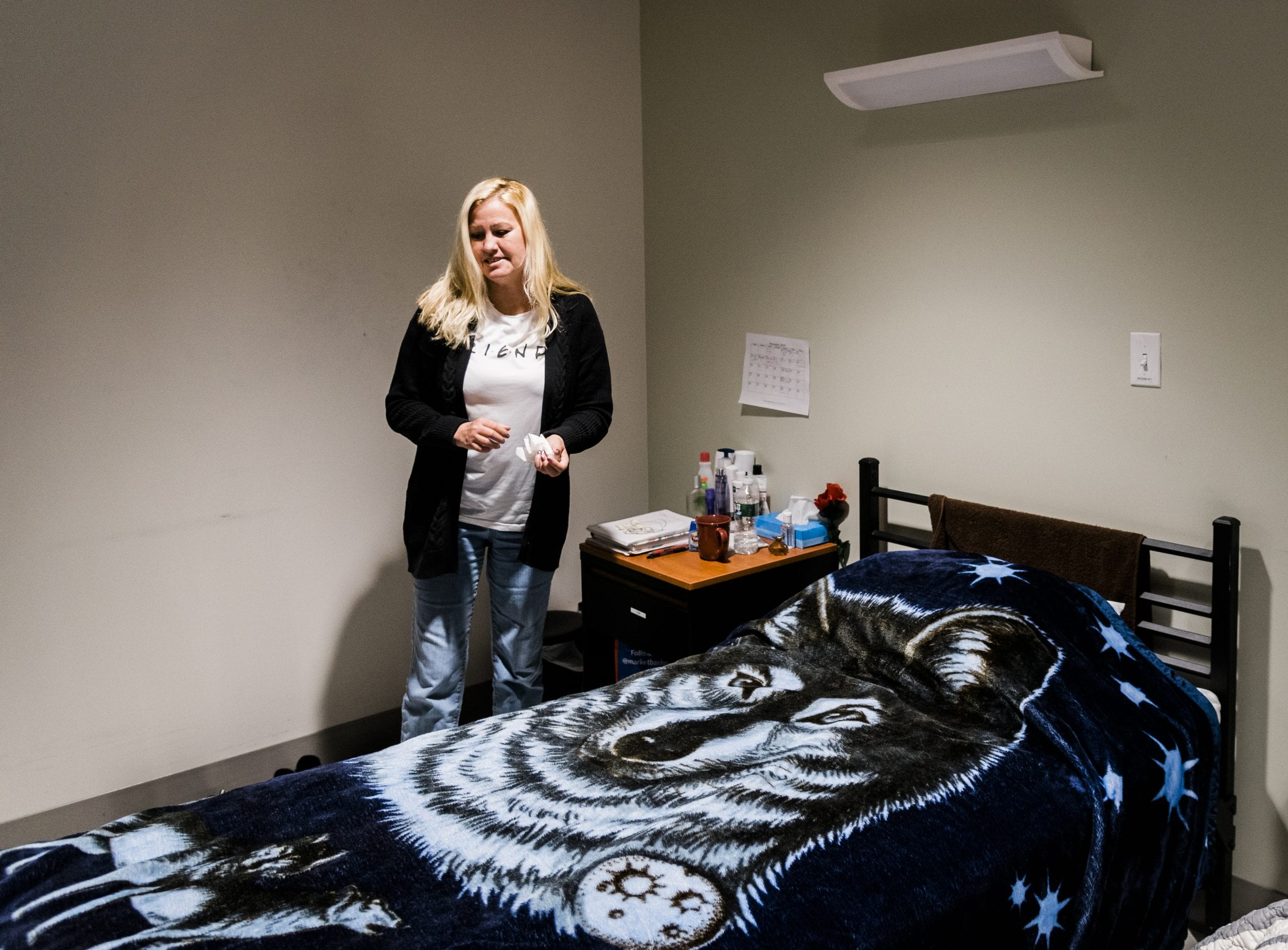LYNN — Kim M., 44, is beside herself with happiness.
After suffering through eight years of an abusive relationship, and then escaping her ex-boyfriend only to endure long stints of homelessness and health problems, Kim, will finally move into her new home on Nov. 18.
“I feel like it’s unbelievable,” Kim said. “I can’t believe it’s actually going to happen until I walk through that door and (lie) on the bed. I’m so incredibly grateful to Beverly. I’m glad I can call her my friend.”
Kim is referring to the help she received from Beverly Clarke, director of recovery and housing services for Bridgewell, an organization that helps support people in need, from those with disabilities to those struggling with substance abuse.
For the past year, Kim has been staying at Bridgewell’s Recuperative Care Center (RCC), which the organization runs with Lynn Community Health Center to provide medical and recuperative care to the city’s homeless after they’re discharged from the hospital. A tour of the center was given on Thursday, which is also meant to cut down on repeat emergency room visits.
“You’re not sick enough to be in the hospital, but not well enough to be in a shelter or out on the streets,” Clarke said. “The Lynn Health Task Force recognized several years ago that there was a need for medicine for people who are homeless because they don’t report to environments unless they’re very ill.”
The RCC also works to help secure housing for guests like Kim, who was referred to the center after she was involved in a car crash on Halloween night 2018 in Salem and broke her leg. She was homeless at the time, splitting her time between the Lynn Shelter and on the streets, which she said was a result of difficult circumstances.
She finally left her abusive relationship after she was stabbed by her ex-boyfriend, but was evicted from her apartment in September 2017, a day after he went to jail. Her landlord was close friends with her ex’s family, she said.
The pair has an 8-year-old daughter, who is staying with his family until Kim can secure a job and her housing situation stabilizes.
“When I came in, I was impressed because it was very clean and wide open,” said Kim, adding she was at a very low point when she came to the RCC. “I never even thought a place like this existed. I’m so happy and so grateful. The people have been caring and helpful since I’ve been homeless.”
The RCC, which opened in March 2018, is only one of a few in the state that provides recuperative care for the homeless. Another similar respite is the Barbara McInnis House in Boston. There’s a strong need for the services, not just in Lynn, but statewide, said Bridgewell CEO Chris Tuttle. An estimated 20,000 people are homeless in Massachusetts.
“If you’re looking at the amount of people who are homeless, who are dealing with significant medical issues, that’s the gap that we’re filling right now,” said Tuttle. “In the short time we’ve been open, we’ve housed close to 30 people so far. These are guests and individuals that without this service, without Lynn Community Health and Bridgewell coming together, they’d be discharged from the hospital with no after-care plan for housing.”
It’s not just about providing medical services and help with securing housing, said Tuttle, but about changing mindsets of the homeless. Some of the people serviced at the center have been homeless for decades, he said.
Getting them into a safe living environment, even for just a couple of days to recuperate, takes them out of a negative space, changes their view of the world and builds trust, which makes them more receptive to services, added Kiame Mahaniah, Lynn Community Health Center CEO.
In its first 20 months, the RCC has served more than 100 people, 55 in the first year and 61 already this year. Due to budgetary constraints, only 10 people can stay in the 14-bed facility each night. A person’s average length of stay is 37 days, and ranges from as short as two days to as long as 170 days. Patients are referred from health centers and hospitals, with most coming from North Shore Medical Center, according to Clarke.
“We’re not a shelter,” Mahaniah said. “You have to have a medical condition to be here.”
RCC case managers been able to help secure housing for 27 people since opening its doors, such as helping them to apply for low-income, U.S. Department of Housing and Urban Development (HUD) units. One of the biggest challenges is the homeless often lose their identification, a requirement of applications, Clarke said, which has to then be confirmed through medical records.
One of the difficulties for providers is knowing that many people are being discharged back out onto the streets or into shelters, according to Gargi Cooper, a nurse practitioner with Lynn Community Health Center who works as the medical director of recuperative care at the respite.
It can sometimes feel like medical providers are fighting a war at the RCC, Cooper said, by patching people up and sending them back into their own care. The population served is also trending older — the average age is 52 and up, she said.
Another challenge is funding. The program is mainly being supported by a three-year, $1.2 million Factor 9 grant, or federal homeless funding. Starting up required about $600,000 in capital costs and the program costs about $700,000 a year to run, Clarke said. Both Lynn Community Health and Bridgewell are also investing their own funds.
“Once we know it’s sustaining itself, we would love to expand and help other communities develop their own health centers,” said Mahaniah.

